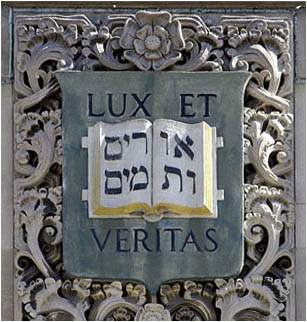This past June, Yale University announced that its Initiative for the Interdisciplinary Study of Antisemitism (YIISA), which had been operating since 2006, was meant to be discontinued. The official reason given by Professor Donald Green, director of Yale’s Institu
te for Social and Policy Studies, was that YIISA was “generating little scholarly work that earned publication in highly regarded journals, and its courses attracted few students.”
Other critiques of YIISA came from Yale faculty members who feared that the program had strayed too far from academia into the realm of advocacy. While that may be true, friends of the program at Yale have stated that the importance of studying anti-semitism academically warrants a restructuring of the program rather than complete closure.
The abrupt closure, which coincided with complaints from the Muslim community against the program, has lead many to believe that academic underachievement may simply be a pretext. Following a YIISA-sponsored conference entitled “Global Antisemitism: A Crisis of Modernity,” Yale’s president, Richard Levin received a scathing letter from the PLO ambassador in Washington, which deplored the attention paid to antisemitism amongst Muslims and Palestinians.
“It’s shocking that a respected institution like Yale would give a platform to these right-wing extremists and their odious views. I urge you to publicly dissociate yourself and Yale University from the anti-Arab extremism and hate-mongering that were on display during this conference,” wrote Ambassador Maen Rashid Areikat.
Yale has defended itself from such accusations of having shut down the program out of acquiescence to such to the Muslim community’s complaints, citing its expansive collection of Jewish library holdings and its preeminent Jewish Studies program. One blogger humorously equated this response to the palliation, “Some of our best friends are Jews.”
The announcement to close the program also came in the wake of Iran’s announcement that the regime would boycott 60 institutions, one of which was Yale University. Although no reason was given for the boycott, Yale professors doing research in Iran were forced to cut their work short. They immediately laid the blame on YIISA rather than on the Islamic Republic of Iran.
Numerous professors at Yale and organizations such as the Anti-Defamation League and the American Jewish committee have expressed deep dismay over the program’s closing. Dr. Phyllis Chesler stated, “Yale has rendered racism respectable, has contributed to the academic isolation of scholars of contemporary anti-Semitism, and snuffed out truth-telling, genuine dissent, free speech, and academic freedom. This will be a permanent stain on Yale and on American academia.”
To the elation of Jewish academics and Jewish organizations around the country, however, university officials have announced that the academic exploration of antisemitism will continue at Yale under the auspices of the newly established Yale Program for the Study of Antisemitism (YPSA). “YPSA will encourage serious scholarly discourse and collaborative research focused on anti-Semitism, one of the world’s oldest and most enduring prejudices, in all of its forms,” explained Provost Peter Salovey. Some of the program’s goals are “to explore this subject matter in a comprehensive, interdisciplinary framework from an array of approaches and perspectives as well as regional contexts.”
Looming large in the background of this story are both the voices that called for the end of the program on the grounds that it too-emphatically cast Jews as victims in a region where they are more often seen as oppressors, and the opposing voices that stood up for academic honesty about a hatred that persists even today and whose roots have yet to be unearthed. The effect of these voices on the university’s policies has in no way been confirmed. What is certain, however, is that as the voices for intellectual voracity and integrity emerge and as more about baseless hatred is understood, our ability to identify circumstances that lead to such hatred will be strengthened. The more we understand, the better we can address situations productively and without speculation. This is a goal to which well-meaning diplomats and advocates such as Ambassador Areikat should look forward with optimism.
Related articles
- YIISA scandal: Yale’s shameful decision to kill its anti-Semitism institute. (slate.com)
- Yale Loses Interest In Antisemitism (powerlineblog.com)
- Lipstadt on Yale anti-Semitism initiative: Advocacy sometimes trumped scholarship (blogs.jta.org)
- Anti-semitism and man at Yale (powerlineblog.com)
- Anti-semitism and man at Yale, take 2 (powerlineblog.com)
- Yale and the anti-Semitism initiative (blogs.jta.org)
- Campus rabbi: Yale anti-Semitism program to be relaunched (jta.org)
- ADL Disappointed At Decision To Shut Down Yale Interdisciplinary Center On Anti-Semitism (dokmz.wordpress.com)
- Lush: “We aren’t anti-Semitic”. (cifwatch.com)
- Shuttering of Yale program on anti-Semitism raises hackles (jta.org)

